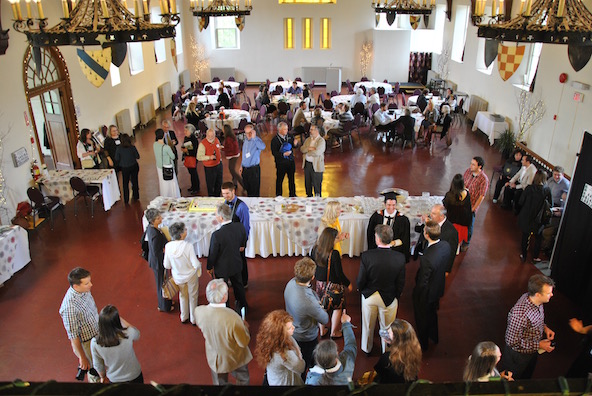News
» Go to news mainA special convocation for MREM graduates
 May 26 was a special day for many, as students from all four Faculty of Management schools celebrated their convocations. For the School for Resource and Environmental Studies (SRES), it was particularly noteworthy: the school celebrated not only its class of 2015, but also the tenth anniversary of the Master of Resource and Environmental Management (MREM) program.
May 26 was a special day for many, as students from all four Faculty of Management schools celebrated their convocations. For the School for Resource and Environmental Studies (SRES), it was particularly noteworthy: the school celebrated not only its class of 2015, but also the tenth anniversary of the Master of Resource and Environmental Management (MREM) program.
Prior to 2005, all SRES graduate students took the thesis-based Master of Environmental Studies (MES) program. Marcus Goodick graduated from the program in 2001. “I actually would have preferred to do the course-based program, but it was still in the development phase,” he says. “With a course-based program like the MREM you are given an opportunity to explore a wider variety of topics through various lenses.” Although he did not experience MREM as a student, Goodick has been involved with the program for years, hiring MREM students when he worked as senior manager of environmental programs at Bell Aliant. “I liked to hire them because they had strong interdisciplinary backgrounds with good problem-solving skills,” he says. “They could hit the ground running and work independently on a wide variety of projects, whether it be policy development, employee engagement, corporate environmental reporting or carbon footprinting.” Goodick is now launching a new business, EnviroCulture Consulting, and is hoping to continue to employ MREM students and graduates.
While the MES program also remains popular, MREM graduates agree with Goodick on the value of having a course-based, practical way of studying the environment. Graduate Jason Parisé, for example, was impressed by “how easily you can tailor your research in each course to something of your interest; for example, I was able to focus most of my work on renewable energy, life cycle assessment and energy systems analysis.” MREM helped Parisé improve his writing and speaking skills. He interned at Scotian Windfields, located in Dartmouth, and he now works there full time as a project manager.
Mike McKinnon also praises the MREM program. While Parisé came to MREM with a background in mathematics and geography, McKinnon had studied commerce. “The MREM program provided me the opportunity to combine the knowledge and experiences I gained in my Commerce degree with environmental, natural resource and scientific perspectives,” says McKinnon. He comments on the warm atmosphere of SRES: “It is like one big family… I have made valuable relationships that will last throughout my career and I am very grateful for this.” McKinnon has also taken up a full-time position with the company where he did his internship, Summerhill Group. “They specialize in energy efficiency programs and have a strong focus on consumer engagement,” he explains.
 “Being part of the graduating class on the 10th anniversary of MREM made the occasion quite special,” says McKinnon of celebrating his convocation.
Melissa Archibald agrees. “This is a fantastic program and I feel honoured that I could be part of celebrating with wonderful staff, faculty, alumni and future resource and environmental managers,” she says. Convocation marked a notable achievement for Archibald, as she graduated on the same day from two Faculty of Management programs—the MREM and the Master of Library and Information Studies (MLIS) from the School of Information Management. “The two degrees fit together really well,” says Archibald. “Research uses and produces a vast amount of information, and the MLIS program has given me the skills to organize, visualize, store, retrieve and manage valuable information needed for researchers to make the most informed decisions possible. The MREM program has given me the knowledge and skills required to work in environmental and resource management and research settings where I can apply what I have learned from both programs.”
Dr. Peter Duinker, one of the School’s first graduates and now a SRES professor himself, has taught, advised and hired MREM students and graduates. He spoke at the convocation celebration about the achievements of the SRES graduates and the beginning of the MREM program ten years ago. “MREM dramatically increased the possibilities for professional students,” noted Duinker. “There are many students who want to investigate environmental and management issues but don’t want to do a thesis.” He spoke proudly of MREM grads who are “fixing environmental problems” and called on the assembled guests to reflect on the world we leave for our pilipiliÂţ»ors. McKinnon obviously took Duinker’s message to heart; he comments, “It’s our generation’s duty to explore and act upon opportunities to reduce our environmental impact. The MREM program can position you to do that.”
Duinker encouraged the graduates: “Celebrate yourselves!” For the students, faculty and staff involved with the MREM program and with SRES, there is certainly much to celebrate.
Recent News
- Amrit Singh (BComm’25) wins top Frank H. Sobey Award
- Students praise impact of Teaching Excellence Award winners
- Celebrating 20,000 Business Work Terms: Jamie McGuigan’s Journey from Dalhousie Student to Scotiabank Leadership
- Q and A with Alison Brown: The twists and turns which led her to Information Science
- The Bachelor of Management is 25!
- From MBA classroom to the frontline of healthcare
- Yirun Wang (BMgmt’24) builds a community while earning his degree
- Building a path forward with work integrated learning
